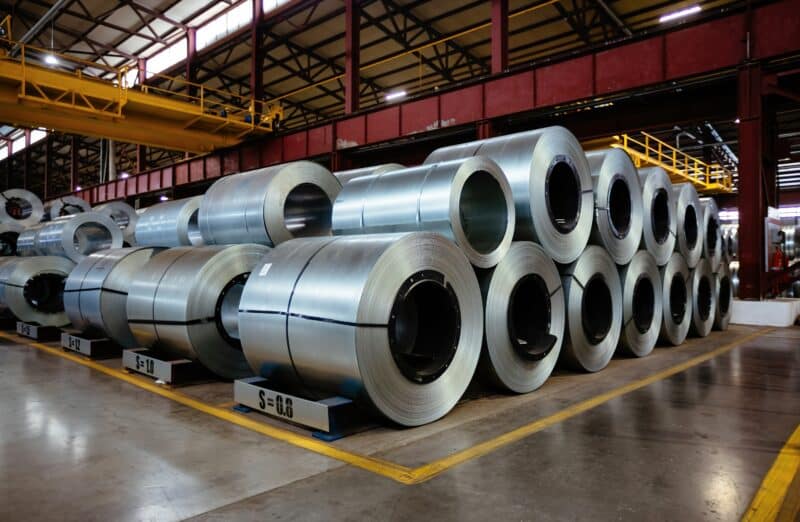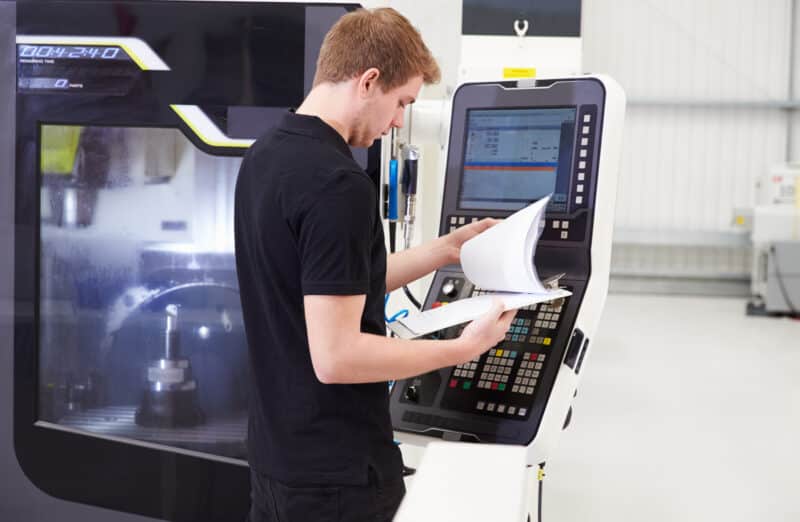Fabrications, Composites, Materials and Packaging
Fabrication, composites, materials engineering, and packaging technologies are integral to Lincolnshire’s industrial landscape, driving innovation, economic growth, and sustainability. This sector encompasses the creation and development of materials – ranging from metals and advanced composites to sustainable packaging solutions – serving industries such as aerospace, automotive, construction, and food manufacturing. By combining traditional fabrication techniques with cutting-edge material and packaging technologies, Lincolnshire demonstrates a commitment to precision, creativity, and environmentally conscious practices on both local and global scales.

This diverse and evolving field offers a variety of opportunities for individuals eager to contribute to industries shaping the future. Whether developing lightweight composite materials for energy-efficient vehicles, fabricating structural steel for critical infrastructure, or designing innovative packaging solutions to reduce waste, careers in this sector provide rewarding paths for a wide range of skills and interests.
Fabrication, composites, materials and packaging technologies in Lincolnshire focus on four distinct areas:

Composites and plastic manufacturing
Composites and plastic manufacturing in Lincolnshire plays a vital role in producing advanced materials used across industries such as automotive, aerospace, construction, and renewable energy. Businesses in this sector specialise in creating lightweight, durable, and versatile materials that enhance the performance and efficiency of products. From crafting carbon fibre components to developing advanced plastic moulding techniques, Lincolnshire is home to innovative processes that meet the demands of modern industry.
Working in composites and plastic manufacturing offers opportunities to be part of a cutting-edge industry. Roles include composites technicians, materials engineers, and production operatives. Day-to-day tasks might involve fabricating components using advanced moulding processes, testing material properties for strength and durability, or collaborating with design teams to develop new applications.
This field is perfect for individuals with a passion for precision and problem-solving. With its focus on innovation and sustainability, the sector offers rewarding career paths for those eager to contribute to the development of materials that shape the future of manufacturing and engineering.

Construction materials and interior firms
Construction materials and interior firms in Lincolnshire are at the heart of creating durable, functional, and aesthetically pleasing solutions for residential, commercial, and industrial projects. These businesses produce essential materials such as bricks, concrete, timber products, and interior fittings like flooring, cabinetry, and bespoke design elements. Combining traditional craftsmanship with innovative techniques, this sector supports both large-scale construction projects and tailored interior solutions, contributing significantly to the regional and national economy.
Working in construction materials and interior firms offers a range of career opportunities across production, design, and technical roles. Positions include production operatives, materials engineers, interior designers, and quality control specialists. Day-to-day tasks might involve manufacturing and testing building materials, designing customised interior elements, or ensuring products meet strict quality standards and client specifications.
This field is ideal for individuals who enjoy a mix of creativity, technical expertise, and practical work. With its focus on crafting materials and interiors that enhance construction and design, the sector provides fulfilling career paths for those passionate about contributing to the built environment.

Precision engineering and fabrication
Precision engineering and fabrication in Lincolnshire is central to creating high-quality components and structures for industries such as aerospace, automotive, energy, and healthcare. These businesses specialise in producing intricate parts, assemblies, and systems that require meticulous attention to detail and advanced manufacturing techniques. From machining complex metal components to fabricating large-scale industrial structures, Lincolnshire’s precision engineering and fabrication firms showcase innovation, accuracy, and craftsmanship that meet the demands of modern industries.
Working in precision engineering and fabrication offers a chance to be part of a highly skilled and detail-oriented field. Roles include CNC machinists, welding technicians, fabricators, and quality assurance inspectors. Daily tasks might involve programming and operating computer-controlled machinery, assembling custom components, or conducting rigorous quality checks to ensure products meet exact specifications.
This field is ideal for individuals who are passionate about problem-solving, precision, and working with cutting-edge tools and technologies. With a focus on innovation and reliability, precision engineering and fabrication provide rewarding career opportunities for those eager to contribute to the creation of products that power industries worldwide.

Materials and packaging technologies
Materials and packaging technologies in Lincolnshire play a vital role in supporting a wide range of industries, including food manufacturing, retail, and logistics. Businesses in this sector focus on creating innovative and sustainable materials, from lightweight packaging to biodegradable and recyclable solutions. These advancements are designed to improve efficiency, reduce environmental impact, and meet the growing demand for eco-friendly practices.
By combining advanced manufacturing techniques with cutting-edge material science, Lincolnshire’s materials and packaging firms deliver high-quality solutions that drive both local and global industries forward.
Working in materials and packaging technologies offers diverse opportunities in design, production, and quality assurance. Roles include packaging technologists, materials scientists, production operatives, and quality control specialists. Daily tasks might involve designing sustainable packaging solutions, testing materials for durability and efficiency, or operating machinery to produce high-volume outputs.
This field is perfect for individuals passionate about innovation, sustainability, and creating practical solutions. With its focus on reducing waste and improving functionality, materials and packaging technologies provide fulfilling career paths for those eager to make a positive environmental impact while advancing modern manufacturing practices.
Check out the different roles below

Management and coordination roles
Management and coordination roles ensure the smooth running of materials and packaging technologies, as well as other manufacturing processes. These professionals oversee production schedules, manage resources, and implement quality and safety standards. Day-to-day tasks may include supervising packaging production lines, coordinating supply chains for raw materials, and resolving operational challenges in packaging or material development projects. Whether it’s leading a project in composite materials or managing the rollout of innovative packaging technologies, these roles combine strategic planning with practical execution.
Key roles: Operations manager, production manager, supply chain manager, health and safety officer, project coordinator, product development manager, process improvement coordinator, packaging development manager, quality assurance manager, site supervisor, environmental planner.
Skills & attributes: Leadership, organisational skills, strategic thinking, problem-solving, knowledge of regulations, communication, adaptability to sustainability practices.
Scorecard
Salary Potential*
Flexible Hours
Flexible Location
Physicality
*based on a 40-hour working week

Core production and manufacturing roles
Core production and manufacturing roles are the foundation of materials and packaging technologies. These hands-on positions involve crafting, assembling, and operating the machinery and systems that transform designs into finished materials and packaging solutions. Workers interpret technical drawings, operate advanced equipment, and ensure production targets and quality standards are met. Maintenance and troubleshooting tasks are also crucial for keeping machinery running smoothly in high-volume production environments.
Key roles: Production operative, machine operator, packaging operative, equipment assembler, extrusion technician, injection moulding operator, maintenance technician, quality control technician.
Skills & attributes: Manual dexterity, technical knowledge, adherence to safety protocols, physical stamina, problem-solving, teamwork, attention to detail.
Scorecard
Salary Potential*
Flexible Hours
Flexible Location
Physicality
*based on a 40-hour working week

Engineering and technical roles
Engineering and technical roles drive innovation and ensure the quality and efficiency of materials and packaging technologies. Professionals in these roles design new materials, develop sustainable packaging solutions, and maintain machinery to ensure production runs smoothly. Daily tasks might include creating detailed schematics using CAD software, testing the durability of packaging materials, or troubleshooting production lines for efficiency. These roles are critical to maintaining sustainability goals and meeting the demands of modern consumers.
Key roles: Mechanical engineer, design engineer, process engineer, materials engineer, packaging engineer, quality assurance inspector, maintenance engineer, production engineer, R&D specialist, testing and validation specialist.
Skills & attributes: Creativity, technical proficiency, problem-solving, analytical thinking, teamwork, attention to detail, familiarity with sustainability initiatives.
Scorecard
Salary Potential*
Flexible Hours
Flexible Location
Phsyicality
*based on a 40-hour working week

Support and administrative roles
Support and administrative roles provide the organisational framework that underpins materials and packaging technologies. These professionals manage logistics, procurement, and compliance while ensuring teams have the resources they need to succeed. Tasks may include sourcing materials for sustainable packaging, coordinating delivery schedules, or maintaining inventory for high-capacity production lines.
Key roles: Document controller, procurement specialist, logistics coordinator, inventory manager, warehouse supervisor, administrative assistant, customer support representative, sales representative.
Skills & attributes: Organisational skills, IT proficiency, communication, budgeting, attention to detail, knowledge of supply chain logistics.
Scorecard
Salary Potential*
Flexible Hours
Flexible Location
Physicality
*based on a 40-hour working week

Specialist roles
Specialist roles in materials and packaging technologies require advanced knowledge and expertise, often focusing on sustainability and innovation. Professionals in these positions develop new materials, test innovative solutions, and integrate cutting-edge technologies into production processes. Daily tasks may include researching eco-friendly alternatives to plastic, designing biodegradable packaging, or overseeing the production of lightweight materials for high-performance applications.
Key roles: Polymer chemist, materials scientist, packaging technologist, sustainability specialist, bioplastics developer, environmental scientist, R&D engineer, product development specialist.
Skills & attributes: Innovation, sector-specific expertise, problem-solving, adaptability, knowledge of sustainability principles, technical proficiency.
Scorecard
Salary Potential*
Flexible Hours
Flexible Location
Physicality
*based on a 40-hour working week
In addition to hands-on roles, businesses in fabrication, composites and materials all rely on essential functions such as marketing, finance, procurement, IT, HR, and operations to ensure smooth and efficient operations. These departments play a crucial role in supporting product development, client services, manufacturing, and innovation, enabling these industries to thrive and drive progress in the manufacturing and engineering sector. For more information on these departments and the roles they offer, click here to explore further.
For information on local courses and qualifications that could support your career in this field, please click here.

